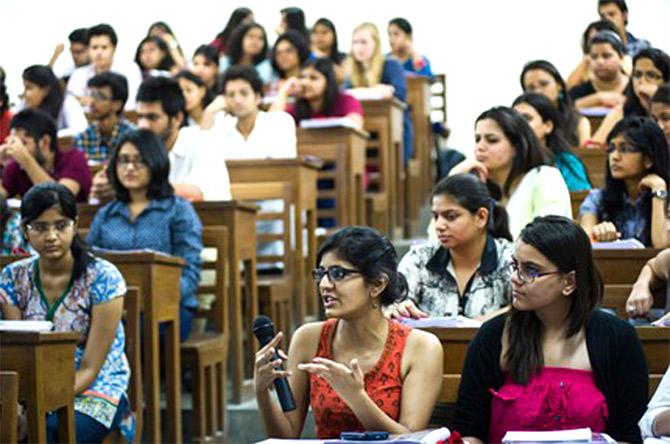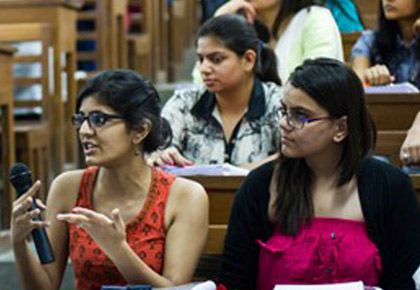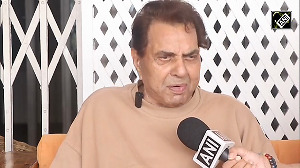This year, as the first batch of students completes their undergraduate degrees under this "new" process, it is worth asking whether we have gained anything?
The answer is a resounding NO, says TCA Anant.

Photograph: Kind courtesy Worldwidecollege.in
Every epoch has its buzzwords, and ours seems obsessed with Reform.
In each sector of the economy we are presented with the need for reform, none more so than in higher education.
An example of this is our being told in 2015 that with a "view to bringing about qualitative improvement" the UGC (University Grants Commission) and MHRD (Ministry of Human Resource Development) would introduce a Choice Based Credit System (CBCS) in institutions of Higher Education in the country.
Since this was a 'reform', and since reform must evidently be done quickly, vice chancellors were advised (or instructed?) it be done from the forthcoming session.
Important issues, such as syllabi, reading material and infrastructure were presumably to be regarded as minor and hence ignored, to be dealt with later (if ever).
What happened was obvious; universities across the land ended up essentially only reclassifying existing courses as core, elective and skill-based, each with a panoply of credits, grade points and what not.
What was totally disregarded in this grand process of repainting education, was the flexibility that the UK/US/EU systems (which inspired the said 'reform') gave their students.
Implemented properly, a choice-based system provides flexibility in attaining learning outcomes, creating a uniform descriptive framework that links student effort and learning outcomes in a standardised framework and allows students to achieve their learning objectives in diverse manners.
This year, as the first batch of students completes their undergraduate degrees under this “new” process, it is worth asking whether we have gained anything? The answer is a resounding NO.
In the countries from where we borrowed this system, the concept of credit is linked to the amount of effort required to attain a learning outcome; this includes assessment of both contact time with teachers as well as the amount of self study required.
To illustrate, at Cornell University the course catalog states "A student will receive one (1) credit by satisfactorily completing a course that requires at least fifteen (15) hours of instruction and at least thirty (30) hours of supplementary assignments. Hours are adjusted proportionately for other formats of study, e.g., laboratory, studio, research, problem-based learning, and independent study." (emphasis added)
Also, students can accumulate credits faster or slower depending on their level of preparedness. More importantly, the emphasis shifts from passing or failing to completing the requirements. This allows a student to redo or substitute credits.
In India, in contrast, CBCS essentially lists a relatively fixed structure of courses, each with a mechanical delineation of credits and exam schedules.
Resource constraints at universities typically restrict students in the manner of instruction and the pattern and structure of coursework.
So, not only can you not proceed faster than your peers, but if you fail a course, you cannot substitute or redo the whole course, at best you can retake an exam. Stripped of all the verbiage, the functional reality of a student's experience remained what it was earlier.
In Delhi University, the desire for reforms led us to shift from the Annual to the Semester System, to a Four-year programme, back to a semester system and then to the CBCS in as many years.
All achieved through a frenzy of activity in the Faculties and Councils of the university. It was as the Red Queen says in Carroll's Through the Looking Glass: "My dear, here we must run as fast as we can, just to stay in place.."
Reform in Higher Education is and should be a process; not frenzied action but deliberation; which involves building consensus amongst the key stakeholders: Namely teachers and students, building infrastructure and most importantly building capacity.
There is clearly something deeply rotten in the systems of institutional governance in the bastions of higher education in India.
If we are to achieve real reform, we must dispense with the constant desire to make aesthetically pleasing cosmetic changes, and consider a properly charted, planned and executed series of changes, which are systematic rather than symbolic; transparent and comprehensive rather than ad-hoc.
Our failure to do this has left our students and teachers unable to achieve their full potential. When given proper support, they can and do compete with the best in the world.
Whatever we do, must be done responsibly and carefully, if we are to achieve anything.
Otherwise we are simply in a state of exhausting frenzied activity, but not moving forward, even as our universities and the system of higher education crumble around us.
Lastly, we must consider the consequences of our actions. The rot of apathy, chaos and cosmetic reforms is destroying not just institutions such as Delhi University and JNU, but in fact undermining faith in modern institutions of democratic governance
The writer is former Chief Statistician of India.












